|
Progressive Men of
Iowa
1899
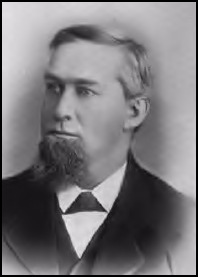 HOOPES, William
Henry, who originated the system of wholesale
gardening on Muscatine island, and developed the
wonderful resources of that fertile spot, is a
son of Lindley Hoopes, who was married November
22, 1838, in Birmingham, Pa., to Miss Mary
Addleman. The family came to Muscatine county
from Pennsylvania in 1854. Lindley Hoopes was
born in Chester county, Pa., in 1815, and his
ancestors came from England with William Penn.
They belonged to the Society of Friends, and
Israel Hoopes, the first in this country, had
sixteen sons. Lindley Hoopes was a builder in
Pennsylvania and followed the carpenter's trade
for a time after coming to Iowa. He is now
engaged in farming and breeding horses, cattle
and hogs in Lake township, Muscatine county.
They are Methodists and strong temperance
people, using their best efforts for the social
and moral welfare of the country. HOOPES, William
Henry, who originated the system of wholesale
gardening on Muscatine island, and developed the
wonderful resources of that fertile spot, is a
son of Lindley Hoopes, who was married November
22, 1838, in Birmingham, Pa., to Miss Mary
Addleman. The family came to Muscatine county
from Pennsylvania in 1854. Lindley Hoopes was
born in Chester county, Pa., in 1815, and his
ancestors came from England with William Penn.
They belonged to the Society of Friends, and
Israel Hoopes, the first in this country, had
sixteen sons. Lindley Hoopes was a builder in
Pennsylvania and followed the carpenter's trade
for a time after coming to Iowa. He is now
engaged in farming and breeding horses, cattle
and hogs in Lake township, Muscatine county.
They are Methodists and strong temperance
people, using their best efforts for the social
and moral welfare of the country.
William H. Hoopes was
born November 19, 1840, at Warrior's Mark,
Huntingdon county, Pa., and was the oldest son
in the family of nine children His early
education was under the tutorship of Bishop John
H. Vincent of Chautauqua fame. He afterwards
attended school in Muscatine. When he
attained his majority he left the farm and
earned his own way through a two years' course
in Greenwood academy, in Muscatine. He
afterwards engaged in the building business, was
principal of the First ward school in Muscatine
two years, and for a number of years was in the
grocery and pork packing business. In 1874 he
commenced the Muscatine Island gardening
business, and with various partners has been
engaged in that important business. He now has
associated two sons they have 900 acres of land
under cultivation there and produce the finest
sweet potatoes, melons, cabbages, peas, beans,
tomatoes and onions. He also has a vegetable and
dairy farm in St. Louis Park, one of the suburbs
of Minneapolis. During his farming career he has
introduced many labor-saving implements. Among
them is one which sets plants of all kinds and
saves labor and expense.
Outside of his own
immediate business Mr. Hoopes has helped promote
the organization of other industries, among them
a canning factory, street railway, electric
light plant, high bridge over the Mississippi
river. In public affairs Mr. party on
account of its championship of temperance
principles, in which he is deeply interested and
to which he has given much of his best efforts.
He was elected alderman as a republican in a
ward usually democratic, and helped to
inaugurate some of the most important public
improvements in Muscatine, including the
building of Riverside Park, which turned an
unsightly river front into a beautiful spot. He
was one of the most zealous supporters of the
prohibitory law and had an important part in the
prosecution of those who violated it. He has
been prominently identified with the Musserville
M. E. church and has been trustee and
superintendent of the Sunday school for more
than twenty years, making him one of the oldest
Sunday school superintendents in the state. He
is also an active member of the Y. M. C. A. and the
Muscatine Commercial club. He belongs to the
Knights of Pythias, Knights of the Maccabees and
Woodmen of the World.
On the 12th of
August, 1869, Mr. Hoopes
was married to Phena Thompson, daughter of
Philip Thompson, a prominent farmer and stock
raiser of Louisa county. Two
children were born to them: Frank Everett, born
April 29, 1870, and Fred Philip, born November
11, 1872. They assist their father in the
management of the farms and the conducting of
their large shipping and commission
business.
The family
has a beautiful home on Beach Grove avenue, a
mile and three-quarters below the post office, on the
west bank of the Mississippi
river.
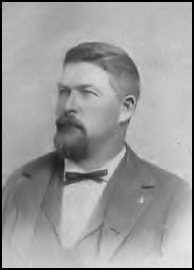 LEITH, Dr.
Alexander R., of Wilton Junction, is a native of
Iowa, although of Scotch descent. His father,
John
P.
Leith, left
Leith, Scotland, in 1839 and settled in Cedar
county, Iowa, when our state was an almost
trackless prairie. He was a plain, outspoken and
honest Scotch-man, who soon won the respect and
confidence of his neighbors. To other sterling
qualities he added the thrift of a typical Scot,
and soon secured a comfortable pioneer home, and
married Maria Boydston, daughter of John
Boydston, who was also a pioneer of Cedar
county. They had ten children, five of whom died
in childhood; the others were Mary M., John P.,
Margaret, George E., and Alexander R., the
subject of this sketch, who was born in Sugar
Creek township, Cedar county, on June 28, 1856.
After studying in the public schools until 14
years old, he attended Wilton college for three
years, taught school for several years, and
attended Eastern Iowa Normal school. He then
went to the State university and took a medical
course, graduating in March, 1882. Soon after
graduation, Dr. Leith located at Wilton
Junction, where he has practiced since. LEITH, Dr.
Alexander R., of Wilton Junction, is a native of
Iowa, although of Scotch descent. His father,
John
P.
Leith, left
Leith, Scotland, in 1839 and settled in Cedar
county, Iowa, when our state was an almost
trackless prairie. He was a plain, outspoken and
honest Scotch-man, who soon won the respect and
confidence of his neighbors. To other sterling
qualities he added the thrift of a typical Scot,
and soon secured a comfortable pioneer home, and
married Maria Boydston, daughter of John
Boydston, who was also a pioneer of Cedar
county. They had ten children, five of whom died
in childhood; the others were Mary M., John P.,
Margaret, George E., and Alexander R., the
subject of this sketch, who was born in Sugar
Creek township, Cedar county, on June 28, 1856.
After studying in the public schools until 14
years old, he attended Wilton college for three
years, taught school for several years, and
attended Eastern Iowa Normal school. He then
went to the State university and took a medical
course, graduating in March, 1882. Soon after
graduation, Dr. Leith located at Wilton
Junction, where he has practiced since.
He is a member of the Iowa State Medical
society, Muscatine County Medical society, and
local surgeon for the Chicago, Rock Island &
Pacific railway. In politics he is a republican,
and is president of the school board, mayor of
Wilton, elected April 28, 1898, and president of
Union bank. In 1880 he married Louisa J.
Parks.
They have had two children: George G.,
aged 13 years, and Walter, who died at the age
of 6 years.
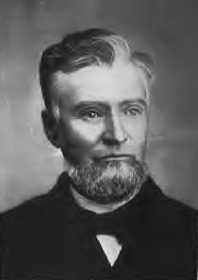 McNUTT, Samuel, one of the
pioneers of Iowa, who has had a large part in
shaping its history, is a resident of Muscatine,
where he is passing his advancing years in quiet
comfort, engaged in literary study and
correspondence. He has contributed to the
preservation of Iowa history by a number of
writings. McNUTT, Samuel, one of the
pioneers of Iowa, who has had a large part in
shaping its history, is a resident of Muscatine,
where he is passing his advancing years in quiet
comfort, engaged in literary study and
correspondence. He has contributed to the
preservation of Iowa history by a number of
writings.
Mr. McNutt was born
November 21, 1825, in the
north
of Ireland,
twenty miles west of Londonderry, and is the son
of Samuel McNutt and Hannah Stewart McNutt. The
family is of Scotch origin and descended from a
somewhat noted ancestry. While he was yet a
child the family came to America, and after a
brief stay in Philadelphia settled in New Castle
county, Del., near the village of Newark. His
mother was now a widow with seven children, of
whom Samuel was the oldest. For forty years she
devoted her life and energies to the education
and interests of her children, three boys and
four girls, the second son, Robert, became an
eminent physician in Louisiana, but as he was a
union man, he barely escaped to the north with
his life, losing all his property in Louisiana.
Governor Kirkwood appointed him assistant
surgeon of the Thirty-eighth Iowa infantry. The
third son, James, also joined the union army,
being attached to the medical department of the
regular army, and for more than a year had
medical charge of Fort Jackson and Fort St
Phillip, below New Orleans. Mrs. McNutt died in
Iowa, December 24, 1874, at the age of 85 years.
Samuel passed his
boyhood working on the little farm in Delaware.
Books were few and his early train-ing was
largely from the Catechism, Psalms of David,
Proverbs of Solomon, Scotch Martyrs and Weems'
Life of Washington. He contributed some poems to
the Temperance Star, of Wilmington, Del., which
attracted the attention of Dr. J. S. Bell, of
Newark, one of the professors in Delaware
college, who assisted the young man to secure an
education. During his college days he
contributed to Peterson'a Magazine, Neal's
Gazette, Godey's Lady's Book, Saturday Courier
and other publications, and his writings had a
wide circulation.
Leaving college he
engaged in teaching and at the same time studied
law under the direction of Hon. Daniel M. Bates,
then secretary of state of Delaware. In 1851 he
went to Milwaukee, was admitted to the bar and
started to practice there, but being offered a
professorship in a collegiate institute in
Hernando, Miss., he went there for two years. In
1854 he came north and located in Muscatine
county, Iowa.
In 1856 he was
principal of the First ward public school and in
that year he and D. F. Wells, who was principal
of the Third ward school, edited the first
educational magazine in Iowa, called the Voice
of lowa, published by Dr. Enos, of
Cedar Rapids. At the close of the year he bought
a half interest in the Muscatine Enquirer, and
became its editor. Subsequently he was associate
editor of the Dubuque Herald, under the
management of Joseph B. Dorr, and remained in
that capacity until 1860, when the paper was
sold to Mahoney & Co.
Mr. McNutt had been a
democrat in politics and a friend and supporter
of Stephen A. Douglas,
but when the southern states began to secede and
the war was threatening, he came out strongly in
favor of the constitution and the administration
of Abraham Lincoln, and supported it by every
means. The Herald being opposed to the
administration, Mr. McNutt, at the request of
democratic friends, started the Daily Evening
Union, to counteract the influence of the Herald
Publication of this paper was discontinued in
about a year with a heavy financial loss, and
Mr. McNutt became one of the editors of the
Dubuque Times.
In the fall of 1862,
intending to go into the army, he removed his
family to his farm in Muscatine county, where he
has since resided. In 1862, while recruiting for
the Eighth Iowa cavalry, he was nominated and
elected by the republicans of Muscatine county
for representative to the Tenth General
Assembly, and was afterwards twice re-elected.
At the close of his third term in the house he
was elected without opposition to the senate. He
had a good record in the legislature, and was
one of the pioneers in the introduction of bills
for the control of railroad corporations. It was
he who secured passage through the house of the
Gue bill, to drive out of Iowa the " wild cat "
currency then in circulation. He was
the chairman of the committee which investigated
the Fort Madison penitentiary in 1872, and wrote
the report which prevented the state from paying
a bogus claim of prison labor contractors for
847,000, and recommended a new penitentiary
where rock could be quarried. This resulted in
the location and erection of the new
penitentiary at Anamosa. In 1872 he was a
candidate for the republican nomination for
state treasurer, and had a large following. He
was prominent in the Grange movement, and is
author of the monster petition signed by 70,000
Iowa farmers, asking for legislation to regulate
railroad charges.
President Harrison
appointed Mr. McNutt, on August 13, 1890, to be
United States Consul at Maracaybo, Venezuela,
but a brief residence in that climate convinced
him that it was not suitable to him and he
resigned and returned to Iowa. He was city judge
in 1894 and 1896. For twenty years be was an
officer of the Muscatine County Agricultural
society, and is a member of the Scotch-Irish
Society of America.
He belongs to the
Presbyterian church but entertains very liberal
views of religion and humanity. He joined the
Washingtonians when a boy; in 1851, the Odd
Fellows; in 1861, the Union League, and in 1872,
the Patrons of Husbandry. Mr. McNutt
was married April 14, 1857, to Miss Anna E.
Lucas, of Portsmouth. Ohio, niece of Robert
Lucas, ex-governor of Ohio. In August, 1889,
while his wife was on a visit lo their son
William, in Nebraska, she was taken sick and
died there. Their living children are: William
L., a farmer in Ord, Neb.; Roberts., a
practicing dentist in Muscatine, and Samuel B.,
a practicing dentist in Des
Moines.
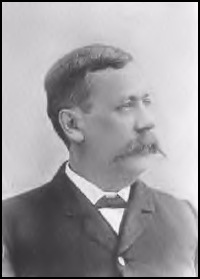 MORGRIDGE,
George Osborn, of Muscatine, is one of the
well-known physicians of eastern Iowa. He is of
Puritan ancestry; his great-great-grandfather,
John Morgridge, came from England soon after
1700 and settled at Newbury Port, Mass., where
he was engaged in shipbuilding. His son,
Samuel, Dr. Morgridge's great-grandfather, was a
man of learning, who also followed shipbuilding
until injured by a fall, after which he was a
teacher.
He married Ruth Siloers, a native of
Ireland, and died June 20, 1772. His son, the
doctor's grandfather, was born at Amesbury,
Mass., August 20, 1760, and died April 19, 1798.
Dr. Morgridge's father, Isaac Morgridge, was
born September 1, 1798, in Maine. At the age of
15 he came to Marion county, Ohio, where he cut
wood and farmed. Two years later he joined the
cavalry to serve on the northern frontier in the
war of 1812, but before reaching the front peace
was declared. He afterwards moved to Iowa, where
he died April 8, 1805. Dr. Morgridge's mother,
whose maiden name was Anner Thankful Ballentine,
was born November 17, 1805, at Schodack on the
Hudson, and was married to Isaac Morgridge at
Marion, Ohio, September 30, 1828. Previous to
her marriage she was a teacher in the public
schools of Columbus, Ohio. She was a daughter of
Dr. Ebenezer Ballentine, who was a graduate of
Yale college, and was commissioned "Surgeon's
Mate" in a Massachusetts regiment during the
revolution. His father, Rev. John Ballentine, of
Scotch descent, was a native of Boston. He
graduated from Harvard in 1735, and was called
to the pastorate of the Congregational church at
Westfield, Mass., in 1740, where he preached for
thirty-five years. He died February 12, 1770,
aged 60 years. MORGRIDGE,
George Osborn, of Muscatine, is one of the
well-known physicians of eastern Iowa. He is of
Puritan ancestry; his great-great-grandfather,
John Morgridge, came from England soon after
1700 and settled at Newbury Port, Mass., where
he was engaged in shipbuilding. His son,
Samuel, Dr. Morgridge's great-grandfather, was a
man of learning, who also followed shipbuilding
until injured by a fall, after which he was a
teacher.
He married Ruth Siloers, a native of
Ireland, and died June 20, 1772. His son, the
doctor's grandfather, was born at Amesbury,
Mass., August 20, 1760, and died April 19, 1798.
Dr. Morgridge's father, Isaac Morgridge, was
born September 1, 1798, in Maine. At the age of
15 he came to Marion county, Ohio, where he cut
wood and farmed. Two years later he joined the
cavalry to serve on the northern frontier in the
war of 1812, but before reaching the front peace
was declared. He afterwards moved to Iowa, where
he died April 8, 1805. Dr. Morgridge's mother,
whose maiden name was Anner Thankful Ballentine,
was born November 17, 1805, at Schodack on the
Hudson, and was married to Isaac Morgridge at
Marion, Ohio, September 30, 1828. Previous to
her marriage she was a teacher in the public
schools of Columbus, Ohio. She was a daughter of
Dr. Ebenezer Ballentine, who was a graduate of
Yale college, and was commissioned "Surgeon's
Mate" in a Massachusetts regiment during the
revolution. His father, Rev. John Ballentine, of
Scotch descent, was a native of Boston. He
graduated from Harvard in 1735, and was called
to the pastorate of the Congregational church at
Westfield, Mass., in 1740, where he preached for
thirty-five years. He died February 12, 1770,
aged 60 years.
Dr. G. O. Morgridge
was born January 26, 1840, at Marion, Ohio. The
first school he attended was taught in an old
abandoned log house, with a drunken cripple for
a teacher. He afterwards attended school at
Bloomington, Ind. In 1857, at the age of 17, he
came to Iowa; crossed the Mississippi at
Davenport with but $2.50 in his pocket, walked
to Tipton, and there secured work in a
brickyard. He was soon afterward engaged for a
time at teaching. During
the second year of the war he offered himself to
his country, and was mustered into the army
October 18, 1861, as a private in Company H of
the Eleventh regiment of Iowa infantry. He was
made first sergeant in March, 1863, and
commissioned captain, October 16, 1864,
commanding his company until the close of the
war. He took part in the battle of Shiloh, both
battles of Corinth, the siege of Vicksburg,
campaign and capture of Atlanta, and Sherman's
march to the sea. He marched in the great review
in Washington at the close of the war, and was
mustered out at Davenport July 24, 1865. He was
twice wounded; at Shiloh April 6, 1862,
and at Nicko-Jack Creek, Ga., July 4,
1864.
Returning from the
war Dr. Morgridge entered the State university,
where he studied nearly two years, then entered
the office of Dr. J. C. Hughes, Sr., of Keokuk,
and in March, 1870, graduated from the College
of Physicians and Surgeons, at Keokuk, and from
the medical department of the State university
in 1874. During the year 1875-6 he completed the
course at Bellevue college, New York, and soon
afterwards moved to Muscatine, Iowa, where he
has made his home ever since, and has enjoyed
the liberal patronage which he
deserves.
Politically, Dr.
Morgridge is a republican. He served twelve
years as a member of the Muscatine board of
education.
He belongs to the Masonic fraternity and
to the Congregational church. He was married in
November, 1866, to Ruth A.
Casebeer,
whose father was a pioneer Methodist preacher
and a pronounced abolitionist. Dr. and Mrs.
Morgridge have had two children: Henry W., born
in 1867, and Myrta E., born in 1870. His son,
Henry, graduated in medicine in 1890, was
associated with him in business until October
25, 1897, at which date he died aged 30 years.
He was a young man of ability and was greatly
loved and respected by all.
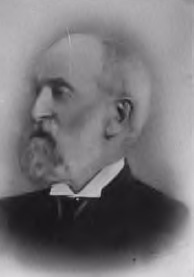 MUSSER, Richard, of
Muscatine, one of the pioneer lumbermen of Iowa,
was a native of Lancaster county, Pa., and was
born in Adamstown on the 15th day of November,
1819. His parents were Peter and Elizabeth
(Adams) Musser, who were also natives of
Pennsylvania. The father was born in Berks
county and was of Swiss origin, while the mother
was born in Lancaster county and was of Scotch-
English descent. He received a common school
education, and began his business career as a
merchant's clerk, and on attaining manhood
engaged in the tanning and leather business in
Pine Grove, Schuylkill county, until October,
1854, when he emigrated to Iowa. The first year
Mr. Musser spent at Iowa City, and in 1855
located at Muscatine, where he formed a
partnership with his brother and Mr. Edward Hoch
in the lumber business, the firm being known as
Hoch & Musser. The partnership was for a
term of three years and at the expiration of
that time Mr. Hoch retired, and the business was
continued under the firm name of R. Musser &
Co. Various changes in the firm occurred, until
the incorporation of the Musser Lumber company
in 1871. MUSSER, Richard, of
Muscatine, one of the pioneer lumbermen of Iowa,
was a native of Lancaster county, Pa., and was
born in Adamstown on the 15th day of November,
1819. His parents were Peter and Elizabeth
(Adams) Musser, who were also natives of
Pennsylvania. The father was born in Berks
county and was of Swiss origin, while the mother
was born in Lancaster county and was of Scotch-
English descent. He received a common school
education, and began his business career as a
merchant's clerk, and on attaining manhood
engaged in the tanning and leather business in
Pine Grove, Schuylkill county, until October,
1854, when he emigrated to Iowa. The first year
Mr. Musser spent at Iowa City, and in 1855
located at Muscatine, where he formed a
partnership with his brother and Mr. Edward Hoch
in the lumber business, the firm being known as
Hoch & Musser. The partnership was for a
term of three years and at the expiration of
that time Mr. Hoch retired, and the business was
continued under the firm name of R. Musser &
Co. Various changes in the firm occurred, until
the incorporation of the Musser Lumber company
in 1871.
In 1849, at Pine
Grove, Schuylkill county, Pa., the marriage of
Mr. Richard Musser and Miss Sarah Filbert,
daughter of Peter Filbert of that place, was
celebrated. In less than a year after her
marriage, Mrs. Musser died, and about five years
later Mr. Musser, who was then in business in
Muscatine, Iowa, returned to Pine Grove, Pa.,
and on March 15, 1855, was united in marriage to
Miss Sarah Elizabeth Berger. Nine children were
born of this union, of whom those now living are
William, residing in Iowa City; Suzanne,
Kathryn, Grace, Gertrude and Linda, living in
Muscatine.
In early life Mr. Musser was a whig in
political sentiment, but on the dissolution of
the old party he joined the infant republican
party, which has since become historic in the
annals of the nation. He took
a warm interest in the cause of education, and
served nine years as a member of the Muscatine
school board. He was a member of the city
council and served two terms as mayor of the
city, first in 1874 and again in 1878. Ho has
been prominently identified with the leading
manufacturing industry of Muscatine for forty
years, and by his energy and enterprise has been
instrumental in building up one of the most
important lumber corporations on the middle
Mississippi. He was also identified with the
extensive sash, door and blind factory, carried
on by the Muscatine Manufacturing company in
Muscatine and Kansas City, the Muscatine
waterworks and other companies. The people of
Muscatine need no printed eulogy of Richard
Musser and his achievements to herald his
praises to the present generation; his works
speak for themselves. But when this generation
shall have passed away and the history of the
people, who, by their enterprise and public
spirit improved and developed the natural
resources of this state, is to be read by
posterity, it will only be proper that the
records should show that the subject of this
sketch was always foremost in encouraging and
sustaining all public improvements calculated to
benefit the city or county at large; that he was
active and influential in organizing various
manufacturing companies that furnished
employment to all classes of labor and which, in
their operation, added wealth and importance to
the city; that he was just and honorable in all
his relations to society, both public and
private, and that the general good and welfare
of the community were considered as well as the
prospect of personal gain. His death occurred on
the 2d of October, 1896, and the little city of
Muscatine has never witnessed a more genuine
expression of widespread sorrow than that which
accompanied the obsequies of Richard Musser. "It
would be a brighter world were there more of his
type left."
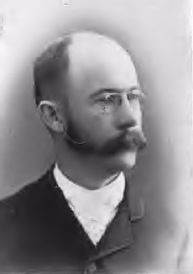 SAWYER, Frank
Payson, who is at the head of one of the most
important industries in the west, lives in
Muscatine and is the secretary and general
manager of the Muscatine Oat Meal company, which
manufactures the celebrated "Friends' oats." Mr.
Sawyer comes of New England ancestors. His
father, Stephen P. Sawyer, was born in Amsbury,
Mass., in 1832, but removed to Hamilton, Ont.,
about 1848, where he lived until 1871. At that
time he removed to Muscatine and retired from
business in order to use his income for the
benefit of his family and to prolong the life
and afford comfort to his wife, who had been a
confirmed invalid for many years. She died March
18, 1897. Her maiden name was Frances Phoebe
Gillett, and she was a native of Newport, N.
H. SAWYER, Frank
Payson, who is at the head of one of the most
important industries in the west, lives in
Muscatine and is the secretary and general
manager of the Muscatine Oat Meal company, which
manufactures the celebrated "Friends' oats." Mr.
Sawyer comes of New England ancestors. His
father, Stephen P. Sawyer, was born in Amsbury,
Mass., in 1832, but removed to Hamilton, Ont.,
about 1848, where he lived until 1871. At that
time he removed to Muscatine and retired from
business in order to use his income for the
benefit of his family and to prolong the life
and afford comfort to his wife, who had been a
confirmed invalid for many years. She died March
18, 1897. Her maiden name was Frances Phoebe
Gillett, and she was a native of Newport, N.
H.
F. P. Sawyer was born
in Hamilton, Ont., November, 30,1856, and he has
lived in Muscatine most of the time since 1872.
His early education was acquired in the Canadian
public schools, well known for their thorough
training and substantial foundations for a
thorough education. He graduated from the
Muscatine high school and entered the Iowa State
university in 1874. During his sophomore year
illness compelled him to retire, and a year's
change of climate and travel in the east
convinced him the only sure foundation and
reliance for life was a trade, and that the
professions and ordinary mercantile pursuits
could not always be relied upon in case of
financial upheaval. So he decided to lose no
time, left college and learned the marble
cutter's trade, which for a time he followed in
Dos Moines. He found this was too arduous an
employment and Involved too great a risk to his
health, so he interested himself in the
Muscatine Oat Meal company, and upon request
became personally identified with the
management. He had been interested in the
concern since its organization, and in 1883 was
placed in the management of the business. Since
he took hold of it, it has grown every year
until now it' is the second largest oat meal
industry in operation in the United States. The
factory is of the greatest importance to the
city of Muscatine, as it employs over 160
persons in addition to a large number of others
indirectly obtaining their income from the
business. The company's trade extends all over
the world, from South Africa to the European
markets, and in all of the large cities of the
United States and Canada. Mr. Sawyer
takes a broad view of the notable business
success which he has achieved and finds his best
reward and the most satisfaction in the benefits
it has brought to others in furnishing
remunerative employment to so many persons. He
is naturally gratified at the financial success
of the enterprise and other Investments that he
has made, but says that the pleasure derived
from the use of such accumulations is that which
affords him the most satisfaction and not the
mere fact of possession. Mr.
Sawyer is a director of the Muscatine Savings
bank and the First National bank and the
Muscatine Water company, and also treasurer of
the latter concern. He is a republican but is
not a hide-bound partisan. He keeps informed on
the effects of political changes upon business
matters and he always reserves the privilege of
voting for the nominee showing the best business
qualifications and recommendations for
integrity. Party ties and obligations do not
strongly bind him. Mr.
Sawyer is a member of the Presbyterian church
and has been secretary of the official board for
about a dozen years. He was
married November 30, 1882, in Milford, Pa., to
Joanna Wells, daughter of H. B.
Wells, probably the most prominent and
successful business man of Pike county, Pa. They
have three children, Henry P., born November 19,
1883; Aura M., born February 17, 1885, and Maud
W., born May 4,
1892.
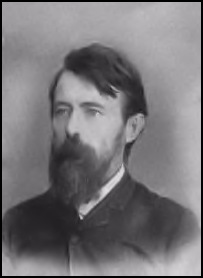 VAN HORNE, George W., late
editor of the Muscatine News-Tribune, who, in
his more than twenty-five years of active
newspaper association, gained for himself the
name of being one of the ablest journalists and
most eloquent of social and political platform
orators in the state, was born in Chicopee,
Mass., October 12, 1833, and died in Muscatine,
Iowa, February 8, 1895. VAN HORNE, George W., late
editor of the Muscatine News-Tribune, who, in
his more than twenty-five years of active
newspaper association, gained for himself the
name of being one of the ablest journalists and
most eloquent of social and political platform
orators in the state, was born in Chicopee,
Mass., October 12, 1833, and died in Muscatine,
Iowa, February 8, 1895.
After a thorough academic
education, he began the study of law, under the
guidance of Judge Gillett, of Westfield, Mass.,
but seeing greater possibilities for his talent
in the growing west, he came to Iowa in 1855,
entering the office of Cloud & O'Conner, at
Muscatine, to complete his studies and learn the
Hawkeye mode of procedure. His
pleasing address, exceptional command of
language and adaptability for his chosen
pursuit, quickly won for him deserved
recognizance, and upon his admittance to the bar
he was taken into partnership by D. C. Cloud,
then the first attorney-general of the state.
His powers as a public speaker sewn drew him
into politics, and in 1860 he was appointed by
Lincoln as consul at Marseilles, France. He held
this post all through the war, having the
distinction of being the youngest man in the
foreign diplomatic service of the United States
during that critical period. Returning to
America in 1866 he accepted the invitation of
the republican state central committee of
Arkansas to take editorial charge of the new
state organ that was being established in Little
Rock; but the newspaper plant was destroyed by
fire before his arrival, involving a complete
loss, and Mr. Van Horne was persuaded to stay in
the south in the capacity of registrar of Scott
county, Ark., under the reconstruction laws of
congress, but he soon resigned his position to
return to Massachusetts.
Mr. Van Horne, for several years
following, turned his attention to various
pursuits in New England, returning to Iowa in
1870 and starting the Muscatine Tribune. He
afterwards bought the Muscatine Courier and the
Betts Bros, were admitted to a partnership which
lasted until Mr. Van Horne withdrew to enter the
lecture field. He was afterwards placed in
charge of the local editorship of the Muscatine
Journal, where he remained until 1887, when the
Muscatine News Co. was
organized and incorporated. Mr. Van
Horne was elected secretary and made
editor-in-chief of the Daily News, which began
publication independent in politics. The
editor, however, had come to have marked
democratic convictions, and soon imbued the
paper with his personality. It quickly became
the recognized official organ of that party in
Muscatine county, and in May, 1889, the
Muscatine Tribune and News were consolidated,
with Mr. Van Horne still the editor-in-chief.
In 1893 he was again the recipient
of political favors, this time from the
democratic party, whose cause he had so
zealously championed in his editorship, being
appointed postmaster at Muscatine by the
practically unanimous desire of his local party,
his commission issuing May 12, 1893. Mr. Van
Horne's genius, as portrayed by his pen, has
been said by able critics to have been
unexcelled by any associate journalist. A
thorough student, he traversed the continent in
his stay abroad with eyes open to the
observation of the many scenes and places made
notable by history and tradition, while his
intercourse in life with those notable in
society and politics added to his qualities as a
"raconteur " and writer. Among other of his
literary efforts for paper and lecture field are
such as "Storied Scenes of Europe," "Old London
Town, " " Picturesque France, " 44 Men and Women
I Have Seen, " " Farmer Whiting Letters," and
"Kaleidoscopes of Memory." In the fall of 1892,
he became a victim to a malignant form of tumor
on his left leg. The surgeons decided that a
thigh amputation was the only recourse, and told
Mr. Van Horne that in submitting himself to the
operation, death was almost inevitable. A week's
respite was asked by him to put his worldly
affairs in order, and then it was that his
journalistic tendencies proved their mastery
over the physical man in the preparation of a
supposedly farewell editorial, written for his
paper and published December 11, 1892, entitled,
"Perhaps a Valedictory," which in its graphic
word painting displayed so truly the strength of
character and noble sentiments of the doomed
writer as to be reproduced and commented upon by
the press universally throughout the west. He
survived the ordeal, however, and lived until
the fall of 1894, when he fell a prey to nervous
prostration, from which he passed away in the
dawn of the following year, mourned by a city
and eulogized by the newspapers of the state in
a manner rarely accorded to one in the private
walks of life.
Mr. Van Horne was married September 15,
1858, to Miss Mary Morrow, only daughter of the
late Dr. James G. Morrow,
one of the founders of Muscatine, and at the
time a step-daughter of his former law partner,
Mr. Cloud. Of this union there were born four
children: Hattie D., born at Muscatine, July 2,
1859; Benny R., born at Chicopee, Mass., July
14,1861, who died in infancy in France; Lulu C.,
born at Marseilles, France, May 3, 1865, now the
wife of Edward G. Magoon, of Muscatine; and
Elworth Stiles, born at Muscatine, June 14,
1874.
The information
on Trails to the Past © Copyright may be used in personal family history research, with source citation. The pages in entirety may not be duplicated for publication in any fashion without the permission of the owner. Commercial use of any material on this site is not permitted. Please respect the wishes of those who have contributed their time and efforts to make this free site possible.~Thank you! |